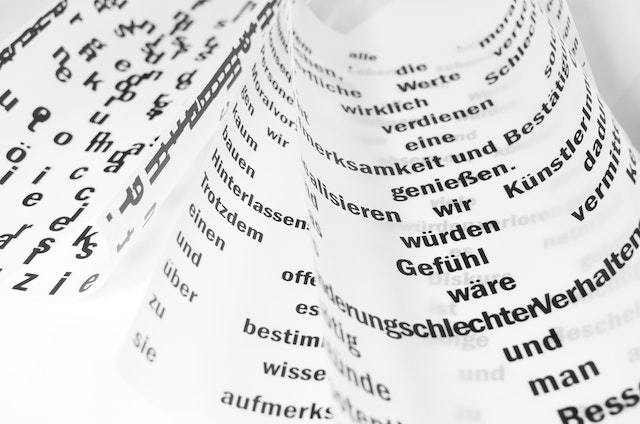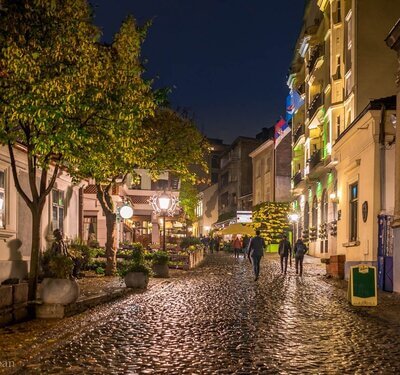Written by: Olivera Tolimir
Is your language spoken in Serbia? There’s a high possibility it is! And we’re not talking about the fact that most young Serbians speak English. But for start, let’s say something about the official languages in Serbia.
The official language in Serbia is, of course, Serbian. The official script is the Cyrillic. The Latin script is also widely recognized. Nowadays, youth use the Latin script even more than Cyrillic because of its international character (and because of easier typing and switching to English keyboard).
Can you guess how many minority languages there are in Serbia? There are fifteen of them! Minority languages in Serbia are in official use in parts of the country where the percentage of that particular minority exceeds 15%.
The minority languages in Serbia are (in alphabetical order): Albanian, Bosnian, Bulgarian, Bunjevac, Croatian, Czech, German, Hungarian, Macedonian, Romani, Romanian, Pannonian Rusyn, Slovak, Ukrainian, and Vlach.
The newest introduced minority language in Serbia is Bunjevac. It happened two years ago, in 2021. Bunjevac became the fourth official language in the northest Serbian town, Subotica. It means every street title sign in Subotica has to be written in four languages! The first name is in Serbian, then Hungarian, Croatian, and Bunjevac.
The interesting thing is that Serbian, Croatian, and Bunjevac are languages so similar that you’d have to try hard not to understand the other two if you speak one of them. It seems funny, but for people from this town, it’s a normal multicultural thing, where everyone’s background is equally respected.
Anyway, we went too far from our initial question. So, what are the top languages in Serbia? Let’s find out!

Serbian
Okay, this one was obvious, but we had to point it out. Of course, the official language of Serbia is Serbian. So, it is the most widely spoken language in the country.
English
Another safe bet. English is not a minority language in Serbia for obvious reasons of the English-speaking minority being inexistent. However, if you’re visiting Serbia as a tourist and don’t speak Serbian – English is the way to go.
We may have a negligible number of native English speakers living in Serbia. But if you’re trying to communicate with locals without the knowledge of Serbian, there’s a high chance they know English.
English is our second language in school. We start learning it from a very young age. However, don’t be surprised if the generation of 1970s and older don’t speak English. They mostly learned German and French during their school days. So, try to find people younger than 40 or 45 when asking for directions in English. If you’re better in German, stick with those of 50 years or older.
Hungarian
We finally came to our first minority language in Serbia! Hungary is Serbia’s northern neighbor, so it makes sense that most (almost all) Hungarians in Serbia live in our northern province – Vojvodina.
Vojvodina was historically a part of Hungary, although many Serbs lived there. After WWI, in November of 1918, Vojvodina joined Serbia. Kingdom Yugoslavia was formed in the same year.
Hungarians in Serbia, like other minorities, can school their children in their native language. It means that every school in every town where Hungarian is a minority language has one or more classes where all subjects are taught in Hungarian. The only difference is that they have an extra subject since the children get a grade from both – their mother tongue and Serbian.
If this seems confusing, let us explain. A class in Serbia isn’t the same as in the USA. All subjects are the same and mandatory. So, it’s impossible to attend advanced math with certain people, and English with others. All children from the same class take every lesson together.
Anyway, let’s learn about Slavic languages in Serbia!

Other Slavic languages
Other Slavic languages widely spoken in Serbia can be divided into two groups: the languages that fell into the Serbo-Croatian language in ex-Yugoslavia, and other Slavic languages.
After Yugoslavia fell apart, every ex-republic wanted their language, just like they had their own nation. So, instead of one language (Serbo-Croatian), we now have Serbian, Croatian, Bosnian, and Montenegrin.
These four languages are the same in a linguistic context, but politically and officially separate. So, if you speak Serbian, you’ll understand Croatian, Bosnian, and Montenegrin perfectly. Maybe you’ll miss a word here and there, but the differences aren’t bigger than those of the Serbian dialects in the northern and southern parts of Serbia.
Other Slavic languages spoken in Serbia are Bulgarian, Bunjevac, Macedonian, Ukrainian, Pannonian Rusyn, Slovak, and Czech.
Bunjevac is the closest to Serbian. We won’t go into the linguistic history, but the Old Slavic language had one sound that turned into different sounds in different languages. While it gave e in Serbian, it gave i in Bunjevac. It doesn’t mean that you should change every e in Serbian to get the Bunjevac language, but you can do it in some words. For example, while in Serbian we say, Mleko for milk, in Bunjevac, the same word will sound, Mliko.
While Serbs and Macedonians can understand each other if they put in a bit of effort, other Slavic languages in Serbia aren’t that similar to the official one?
Bulgarian is the next closest to Serbian, but you’d have to speak Serbian perfectly and understand Slavic linguistics if you’d like to talk with a Bulgarian effortlessly.
For other Slavic languages, you’ll need language lessons!
Albanian
Albanian is widely spoken in Southern Serbia since most Albanians live in the Southern part of the country. Unfortunately, we don’t have the exact data about the number of Albanian speakers in Serbia because of political reasons.
Kosovo and Metohija, a Southern Serbian province, declared unilateral independence in 2008. From the total of 195 countries in the world, around 100 have recognized the independence of Kosovo. Serbia is, of course, not among them.
But even if we don’t take the Southern province into account for the lack of data, Albanian is a minority language in several municipalities in Serbia, such as Preševo, Bujanovac, and Medveđa. Just like Hungarians and every other official minority in Serbia, they have the right to schooling, media, and administration in their native language.
Where are minority languages in Serbia used?
We mentioned that minorities in Serbia can choose to school their children in their mother language. But that’s not all. There are media in minority languages. So, we have news, shows, newspapers, and so on in Bunjevac, Hungarian, Croatian, etc.
The minority languages in Serbia are also used in administration. For example, if you’re in a part of Serbia where Bulgarian is a minority language, you can ask for a birth certificate in that language.
Did you know that Serbia has this many minority languages? Did you find your language among them? If you haven’t and doesn’t want to speak English in Serbia, the best solution is to learn Serbian! Choose one of our awesome Serbian teachers and book your private class now!



